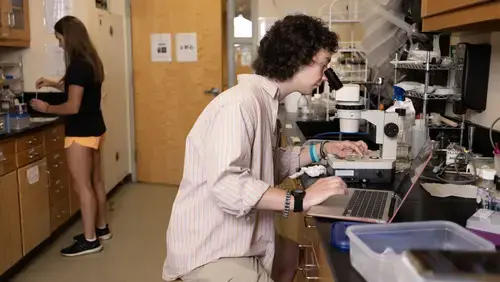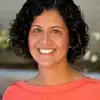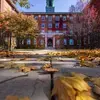The overwhelming majority of students from Holy Cross and nationally take a year or more off between college and medical school. There are many good reasons for doing this.
First, remember that to attend medical school directly after college, the student must apply in the summer after the junior year. Because such applicants still have 25% of their college career ahead of them and often do not have as many other experiences, it is usually harder for them to get into medical school. They usually must have higher GPAs and MCAT scores than those who have completed the full four years of college (or more).
Second, a student may need to strengthen her or his credentials by taking additional courses or engaging in clinical, research or other meaningful experiences. Such a person would need to take at least two years off between college and medical school as the application process itself takes at least a full year.
Finally, given the time and financial expense of medical school, and the lifetime commitment to serving others it requires, many people are simply not ready to make the decision begin medical school directly after college.
As a result, most people are best served by doing something else after graduation. The question is, what? The answer is complex — it depends on what the person needs.
Here are some common choices of activities to pursue in gap years:
Clinical Experience
There are several entry-level careers for students looking for clinical experience.
Jobs such as certified nurse's aide (CNA), personal care attendant (PCA), medical assistant (MA), phlebotomist, and medical technologists usually require a short course or training program. The Red Cross and many community colleges offer training programs for such positions. Some employers are willing to train on the job. Watch Handshake from the Center for Career Development for such opportunities. Work as an emergency medical technician (EMT) may also be helpful; however, ambulance jobs do not always offer the extended time with patients that many medical schools value. Sometimes EMT training may help secure a position as ER technician.
In addition, some clinical research coordinator (CRC) positions offer the chance to work with patients.
Fellowships
Distinguished awards such as Fulbright, Goldwater, Marshall, Mellon, and Rhodes fellowships can provide once-in-a-lifetime opportunities and enhance applications to medical school.
The Holy Cross Office of Distinguished Fellowships and Graduate Studies can help students identify and apply for such programs.
Research
Many graduates decide to obtain a position as a research assistant (RA), research technician, clinical research coordinator (CRC) or other roles conducting research in hospitals, biotechnology firms, pharmaceutical companies and academic institutions.
A common path is a CRC in an academic medical center. Such jobs have advantages: they offer research experience but also the opportunity to work directly with patients and shadow physicians. Some offer discounts on courses taken at affiliated universities. The clinical research coordinator job market is very fluid: major teaching hospitals post positions on their website and fill them quickly. The market is most active between March and October, when clinical research coordinators announce they are leaving jobs for medical or graduate school. The title for a bachelor's degree level of training position is usually a "CRC2", and the commitment is usually for about two years. The Holy Cross Center for Career Development can help guide you to find a research position. Many research groups recruit graduating Holy Cross students and alumni directly; such positions are posted on Handshake.
Enhance Academic Credentials
Some graduating students do not have the academic foundation to be competitive for medical school curriculum. In such a case, it is a good idea to take additional courses in person at a high-quality, four-year institution. Some medical schools do not accept courses taken at community colleges or on-line.
Courses should be taken in areas of concern. It is usually not helpful to retake classes unless the grade is C- or below. It is much more helpful to take advanced electives in areas of weakness. The key is to demonstrate that the applicant can successfully apply scientific knowledge in applied coursework with medical applications.
Some students even choose to pursue a master's degree or other post-baccalaureate program. Some master's programs are specifically designed to prepare applicants for medical school; they are called "academic record enhancers." Others called "career changers" provide the basic science coursework for students with no previous exposure. There are also programs for groups underrepresented in medicine and economically or educationally disadvantaged. The Association of American Medical Colleges provides a database to find such programs. Some master's programs are only useful for helping applicants gain acceptance to medical school. They are expensive and competitive and do not offer a guarantee of admission, but many students have successfully applied to medical school after such programs. Others offer degrees that may be used in professional settings, for example master's in anatomy, immunology, etc.
Work in Community
Deep engagement with the community through programs like Teach for America, City Year, AmeriCorps, Peace Corps, Boston Healthcare for the Homeless Program, and Jesuit Volunteer Corps provide valuable experiences.
The Holy Cross Chaplains’ Office has information on many programs.
Work in Professional Setting
Physicians and other healthcare providers are professionals, and must be able to work with a broad array of other professionals. As a result, work in any professional setting is valuable for a career in medicine.
If a student is considering a vocation other than medicine, spending time working in an alternative career will also help him or her discern the best fit. Medical school admissions committees do not consider this wasted time, as they appreciate applicants with broad experiences who have carefully thought about their choices. However, it is a good idea to continue to volunteer in some sort of support capacity, ideally working directly with diverse populations.
The Holy Cross Center for Career Development can assist students in finding a career that meets their talents, experience and passions.




